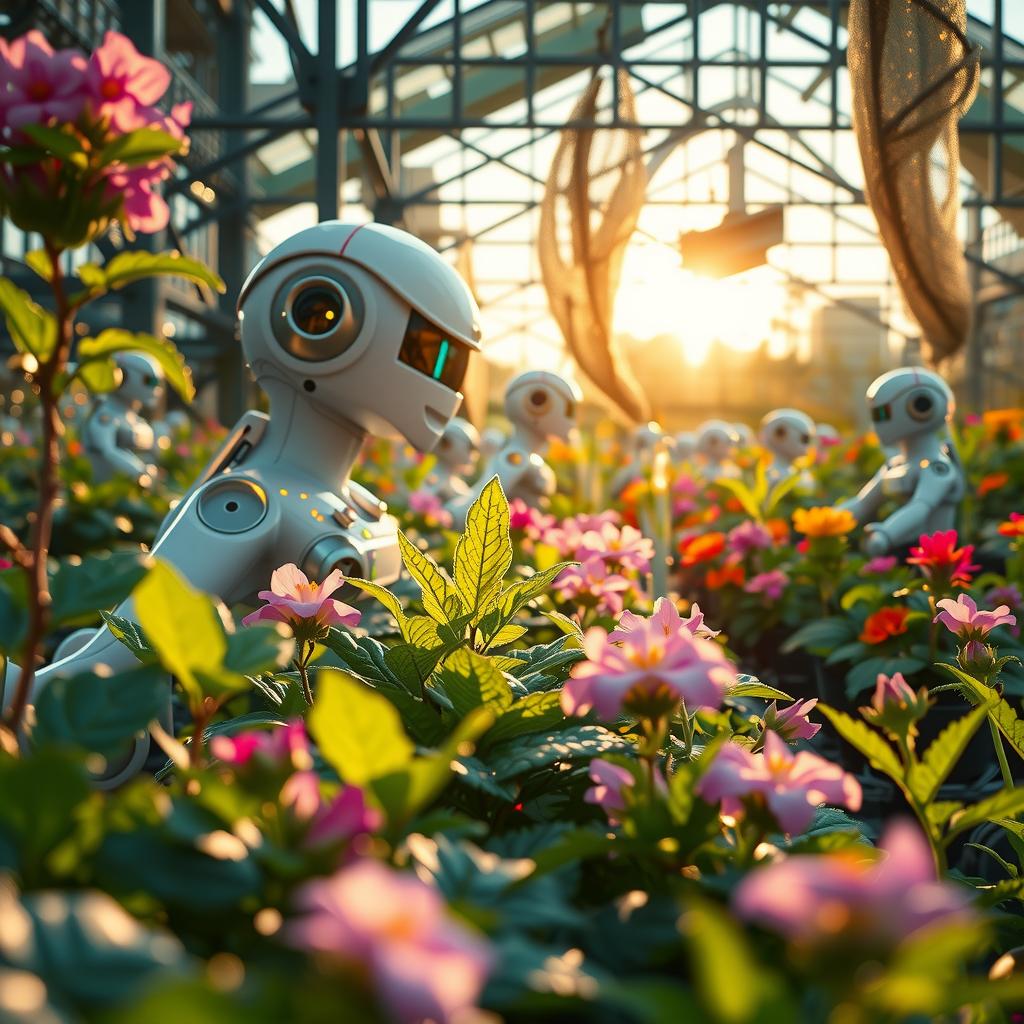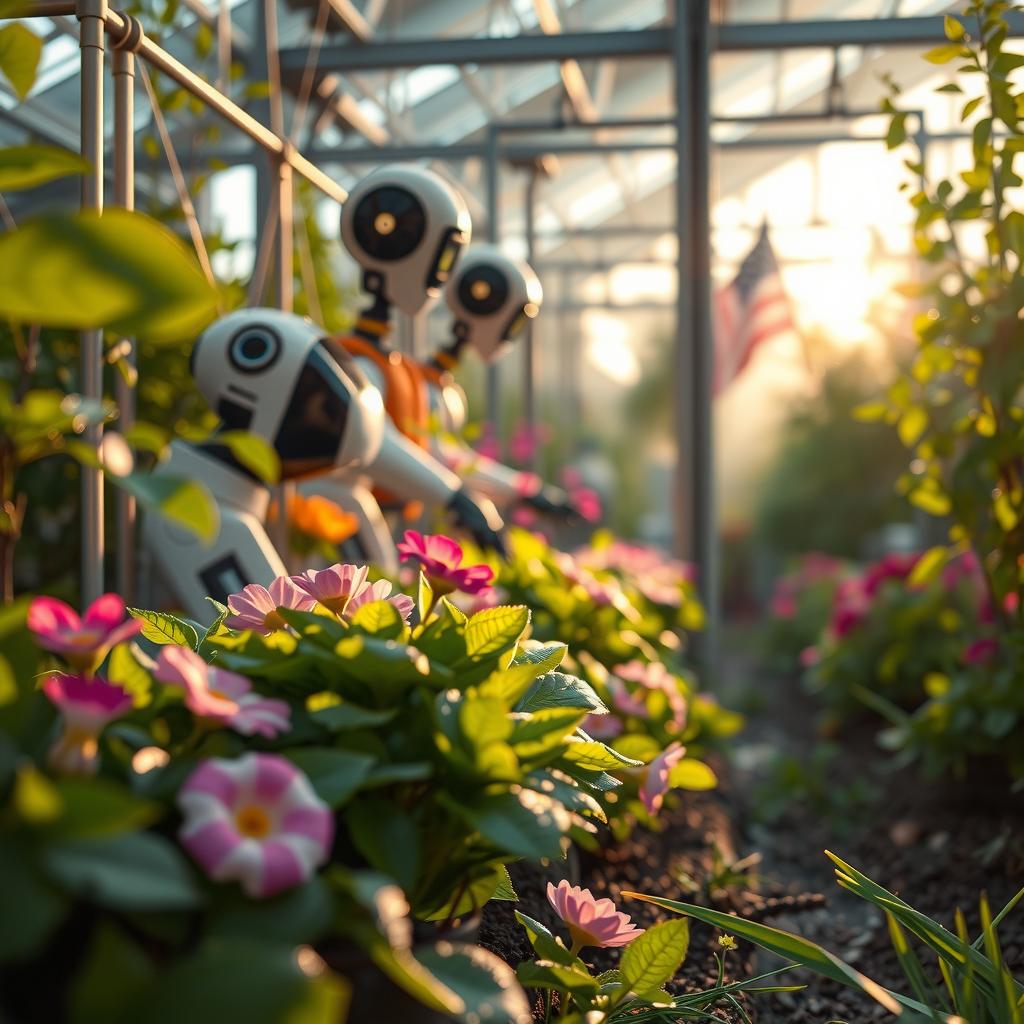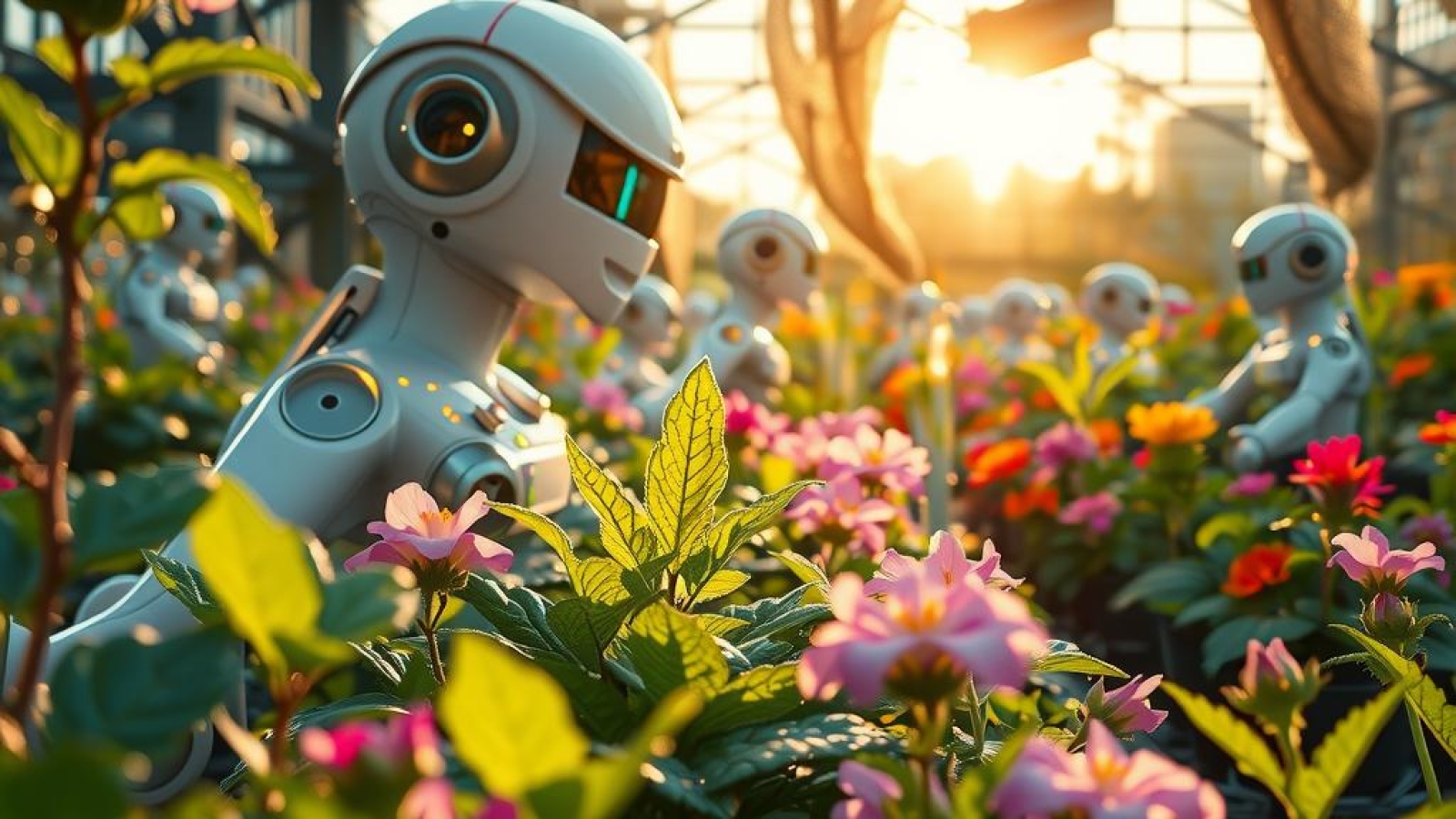In an age where technology seamlessly integrates into daily life, the realm of gardening is undergoing a revolutionary transformation. The advent of Smart Gardening technologies offers homeowners and gardening enthusiasts alike a unique opportunity to elevate their plant care and lawn maintenance practices through automation and advanced monitoring systems. This modern approach not only enhances efficiency but also ensures optimal conditions for plants to thrive. With solutions such as Smart Irrigation Systems, which intelligently deliver water based on real-time weather data, gardeners can say goodbye to the guesswork traditionally associated with watering schedules. These systems utilize Weather Integration features that adapt irrigation practices in response to changing climatic conditions, significantly reducing water wastage while promoting sustainable gardening.
Moreover, tools like the Soil Monitor play a crucial role in providing insights into soil moisture levels and nutrient content, allowing users to fine-tune their care routines for maximum effectiveness. Through these advancements in technology, individuals can embrace Automated Plant Care, ensuring their gardens receive precise attention tailored to each plant’s specific needs. The benefits extend beyond mere convenience; they also contribute substantially toward achieving exceptional results in plant health optimization.
For those invested in maintaining expansive lawns or vibrant landscapes, Automated Lawn Tools present an ideal solution for streamlined upkeep without sacrificing quality. These devices are equipped with intelligent scheduling functions that allow users to program mowing times or fertilization cycles effortlessly—freeing up valuable time while ensuring meticulous care and attention are provided consistently over time.
As urban spaces evolve and more people seek ways to reconnect with nature amid busy lifestyles, adopting innovative strategies through products like Smart Gardening becomes essential not just for aesthetics but also for cultivating resilience against environmental challenges. By incorporating smart technologies into everyday garden management tasks—from planting decisions based on seasonal variations to comprehensive lawn maintenance—the modern gardener stands poised at the forefront of this green revolution.
This blog post aims to delve deeper into how integrating advanced technologies transforms traditional gardening methods into sophisticated yet user-friendly experiences that cater specifically to individual needs while fostering sustainability across all landscapes. In exploring these various facets of automated solutions available today within the umbrella of Smart Gardening, readers will find themselves inspired by new possibilities waiting just beyond their backyards.

Key Points:
-
Smart Irrigation Systems: A critical advancement in garden care, Smart Irrigation Systems utilize real-time data to optimize water usage. These systems are equipped with sensors that monitor soil moisture levels, ensuring that plants receive the precise amount of water they require. With features such as weather integration and automated scheduling, these systems significantly enhance plant health while conserving resources. The implementation of Smart Gardening solutions allows gardeners to focus on other tasks while maintaining optimal hydration for their gardens.
-
Soil Monitors: Essential for understanding the needs of various plants, soil monitors provide invaluable insights into nutrient levels and pH balance within the garden’s ecosystem. By integrating with Automated Plant Care, these devices collect data which can be analyzed to inform decisions about fertilization and watering schedules. The adoption of Smart Gardening technology enables gardeners to maintain healthy soil conditions effortlessly, promoting robust growth and vitality in their green spaces.
-
Automated Lawn Tools: Revolutionizing traditional lawn maintenance practices, automated lawn tools are designed to streamline various tasks such as mowing, edging, and even leaf collection. These tools often come equipped with advanced features like scheduling capabilities and remote operation via smartphone applications. With Smart Gardening innovations at play, users can ensure a well-kept yard without the manual labor typically associated with lawn care—allowing them more time to enjoy their outdoor sanctuary while achieving superior results in both aesthetics and plant health optimization.

Revolutionizing Your Garden with Smart Technology
Discover the Future of Automated Plant Care
In an era where technology seamlessly integrates into daily life, gardening is no exception. The advent of Smart Gardening has transformed traditional horticulture practices, providing gardeners with innovative solutions to optimize their green spaces efficiently. At the core of this transformation lies the smart irrigation system, a pivotal component in Automated Plant Care that ensures optimal water usage for plants. These systems leverage advanced sensors and weather data to tailor watering schedules according to real-time environmental conditions, effectively preventing both overwatering and underwatering—two common pitfalls in lawn maintenance. With features such as soil moisture sensing and weather integration, these automated tools adjust water delivery based on precise needs rather than arbitrary timings. This not only conserves precious resources but also enhances plant health optimization by providing roots with exactly what they require when they need it most.
Enhancing Water Efficiency Through Automation
Unleashing the Power of Smart Irrigation Systems
The efficiency brought about by smart irrigation systems cannot be overstated; they represent a significant leap forward from conventional methods that often waste water through inefficient scheduling or manual control. By adopting Smart Gardening, users can implement automated lawn tools that monitor various parameters through integrated soil monitors which gauge moisture levels accurately before activating sprinklers or drip lines as needed. Such precision minimizes runoff and evaporation losses while maximizing hydration directly at the root level where it’s most beneficial for growth. Moreover, modern systems often come equipped with scheduling functions that allow homeowners to plan watering cycles around peak sunlight hours or anticipated rain events, further improving resource management without sacrificing garden vitality.
Real-Time Monitoring: The Heartbeat of Effective Garden Management
Stay Ahead with Soil Monitors and Weather Integration
One standout feature within Smart Gardening is its ability to incorporate real-time monitoring through soil sensors combined with robust weather integration capabilities. These dual functionalities ensure that gardens are not just watered blindly but cared for intelligently based on comprehensive data analysis tailored to specific plant needs and local climatic conditions. For instance, if rain is forecasted within a few days, the system automatically adjusts its schedule accordingly—potentially saving gallons of water while simultaneously promoting stronger root development due to consistent moisture levels in conjunction with natural precipitation patterns. Such intelligent automation supports healthier ecosystems within each garden plot while reducing labor demands typically associated with manual monitoring efforts.
Scheduling Functions: Precision Timing for Optimal Growth
Crafting Ideal Conditions Without Hassle
The implementation of sophisticated scheduling functions represents another breakthrough offered by Smart Gardening. Users can customize their irrigation timelines effortlessly via mobile applications linked directly to their smart devices—even from miles away! This flexibility allows gardeners who may have busy lifestyles or travel frequently not only peace of mind regarding their plants’ welfare but also fosters greater engagement when managing outdoor spaces remotely—a revolutionary concept in landscape upkeep today! Furthermore, these well-timed interventions help create ideal growing conditions across varying seasons without constant human oversight—a boon for those passionate about maintaining vibrant gardens yet constrained by time limitations.
Through embracing automation technologies like those found in Smart Gardening, individuals can significantly enhance both sustainability practices related to water use along with overall gardening success rates—ensuring lush landscapes thrive year-round without undue stress on either flora or fauna alike!

Effortless Lawn Maintenance: Revolutionizing Gardening Tasks with Automation
Embrace the Future of Lawn Care
The world of gardening has undergone a remarkable transformation, largely due to the emergence of automated lawn care tools that simplify traditional tasks. With innovations such as Smart Gardening, homeowners can now experience an effortless approach to maintaining lush and vibrant lawns without the usual labor-intensive effort. Automated Plant Care systems have been designed to take over mundane chores like watering and mowing, allowing individuals more time for leisure activities while ensuring their gardens thrive. These advanced tools utilize integrated technologies including Smart Irrigation Systems and Soil Monitors that assess moisture levels in real-time, ensuring plants receive exactly what they need when they need it.
Harnessing Technology for Optimal Results
Central to this evolution is the concept of Weather Integration, which allows automated systems to adjust their operations based on current weather conditions. For instance, if rain is forecasted, a Smart Gardening tool will delay irrigation cycles accordingly—saving water and preventing oversaturation in soil. This intelligent scheduling function not only enhances plant health but also contributes significantly towards sustainability efforts by reducing excess resource use. By employing these cutting-edge solutions, gardeners can achieve optimal results with minimal intervention; thus revolutionizing how landscapes are tended.
The Role of Scheduling Functions in Lawn Maintenance
Scheduling functions within automated lawn maintenance tools play a crucial role in streamlining gardening tasks effectively. Homeowners using Smart Gardening products can set specific times for various maintenance activities such as mowing or fertilization—all tailored around personal schedules or seasonal changes pertinent to local climates. This means no longer does one have to worry about remembering when last they watered or mowed; the system takes care of this effortlessly! Furthermore, some systems even allow remote access via smartphone applications enabling users direct control from wherever they may be located—offering convenience that modern lifestyles demand.
Enhancing Plant Health Optimization Through Automation
Beyond mere convenience lies another key benefit: enhanced plant health optimization facilitated through these innovative technologies. The combination of features found within Smart Gardening tools offers comprehensive monitoring capabilities that provide insights into soil composition and hydration needs throughout different seasons or growth stages. Sensors detect nutrient deficiencies or imbalances early enough so corrective measures can be implemented swiftly before any visible signs manifest adversely affecting garden aesthetics or integrity.
Conclusion: A New Era Awaits Gardeners Everywhere
As society continues its journey toward greater automation across all sectors—including home gardening—the adoption rate for these automated lawn care solutions shows no signs of slowing down anytime soon! Products like those offered under Smart Gardening promise not just innovation but also unprecedented ease-of-use designs aimed at enhancing user experiences while achieving beautiful outdoor spaces sustainably—a goal every gardener dreams about! Ultimately embracing technology within horticulture ensures effective strategies translate into flourishing greenscapes enjoyed by generations ahead.
The Role of Weather Data in Plant Care Systems
Leveraging Intelligent Scheduling for Optimal Growth
In the realm of modern horticulture, integrating weather data into plant care routines has proven to be a game-changer. With solutions like Smart Gardening, gardeners and landscapers can harness real-time meteorological information to enhance their Automated Plant Care strategies. This integration enables an intelligent scheduling function that aligns gardening activities with prevailing weather conditions, thus optimizing plant health. For instance, understanding rainfall forecasts allows users to adjust irrigation schedules effectively, reducing water wastage while ensuring plants receive adequate hydration. Furthermore, temperature data can inform decisions on pest control measures or the need for frost protection in sensitive species. By utilizing these insights through platforms such as Smart Gardening, cultivators are empowered not only to maintain but also to elevate the overall health and vigor of their gardens.
Enhancing Irrigation Practices through Weather Insights
Smart Irrigation System: A Sustainable Approach
The advent of advanced technologies has transformed traditional irrigation methods into more sustainable practices through systems like Smart Gardening. By incorporating local weather forecasts and historical climate patterns, this system optimizes watering schedules based on actual environmental needs rather than preset timers that may lead to overwatering or underwatering. For example, a smart irrigation system can automatically suspend watering during periods of expected rain or increase frequency during drought conditions detected by soil moisture sensors integrated within the platform. Such responsiveness is critical not only for conserving water resources but also for promoting healthier root systems that thrive under balanced moisture levels—a cornerstone principle in Lawn Maintenance. When paired with tools like Soil Monitors, which provide continuous feedback about soil conditions, users gain unparalleled insight into when and how much to irrigate.
Benefits of Automated Lawn Tools in Weather Adaptation
Efficiency Meets Precision
With tools offered by Smart Gardening, automated lawn maintenance becomes increasingly efficient as it adapts dynamically based on weather changes. These automated lawn tools are designed not just for routine mowing but incorporate features that respond intelligently to climatic variations; they adjust cutting height according to growth rates influenced by seasonal shifts or precipitation levels reported via integrated weather services. This ensures lawns remain lush without compromising plant health due to stress from improper care routines often dictated solely by time intervals rather than necessity—the hallmark characteristic of traditional methods.
Proactive Pest Management Through Weather Monitoring
Protecting Plant Health Effectively
Weather patterns play a pivotal role in pest life cycles; therefore, leveraging this knowledge is crucial for any effective garden management strategy via solutions like Smart Gardening. By analyzing climatic trends alongside existing pest populations reported within localized databases—such as those concerning temperature thresholds conducive for specific pests—gardeners can implement preventative measures before infestations escalate into major problems requiring intensive intervention techniques such as pesticides application which might harm beneficial insects if misapplied at inappropriate times.The proactive scheduling function empowers users with alerts regarding optimal times for applying biocontrols or repellents aligned perfectly against predicted favorable conditions enhancing efficacy while minimizing negative impacts on ecosystems surrounding cultivated areas.
Conclusion: Towards Future-Ready Plant Care Solutions
Embracing Innovation in Horticulture
As technological innovation continues shaping agricultural practices worldwide towards sustainability goals embracing approaches exemplified by Smart Gardening will become indispensable within varied gardening contexts—from private home gardens seeking aesthetic appeal down commercial landscapes aiming profitability whilst preserving ecological integrity.All stakeholders involved must recognize the value provided through enhanced visibility afforded via sophisticated analytics derived from consolidated datasets encompassing both current atmospheric states coupled historical precedents guiding informed decision-making processes around every aspect related directly impacting Plant Health Optimization.
Automating plant care has become increasingly popular, and for good reason. With Smart Gardening, homeowners can now leverage cutting-edge technology such as smart irrigation systems and soil monitors to enhance their gardening experience. These innovations allow for precise watering schedules based on real-time moisture levels, ensuring that plants receive the optimal amount of water necessary for healthy growth. This form of Automated Plant Care not only conserves water but also prevents overwatering, which is a common issue among traditional gardening methods.
When it comes to lawn maintenance, automated tools are game-changers. Smart Gardening offers various automated lawn care tools that significantly reduce the manual labor associated with yard work. These devices can be programmed to mow lawns at specific times or when weather conditions are most favorable, allowing homeowners more free time while maintaining a pristine landscape. Furthermore, with features like weather integration and scheduling capabilities, these tools ensure that lawn health is optimized throughout different seasons.
Soil health plays a crucial role in successful plant cultivation; hence the inclusion of soil monitors within the realm of Smart Gardening is essential. These devices provide valuable insights into nutrient levels and pH balance in real-time, enabling gardeners to make informed decisions about fertilization and amendments needed for optimal plant health optimization. As part of an integrated system alongside smart irrigation solutions and other automated garden technologies, soil monitors contribute significantly to creating thriving gardens with minimal effort.
Common Inquiries:
Q: How does a smart irrigation system work?
A: A smart irrigation system uses sensors to monitor moisture levels in the soil and adjusts watering schedules accordingly through automation.
Q: What benefits do soil monitors provide?
A: Soil monitors help gardeners understand nutrient content and pH levels in their garden beds, allowing them to optimize fertilizer use efficiently.
Q: Can automated lawn care tools really save time?
A: Yes! Automated lawn care tools manage mowing schedules independently based on programmed settings or weather conditions, freeing up significant time for homeowners.

Add a Comment